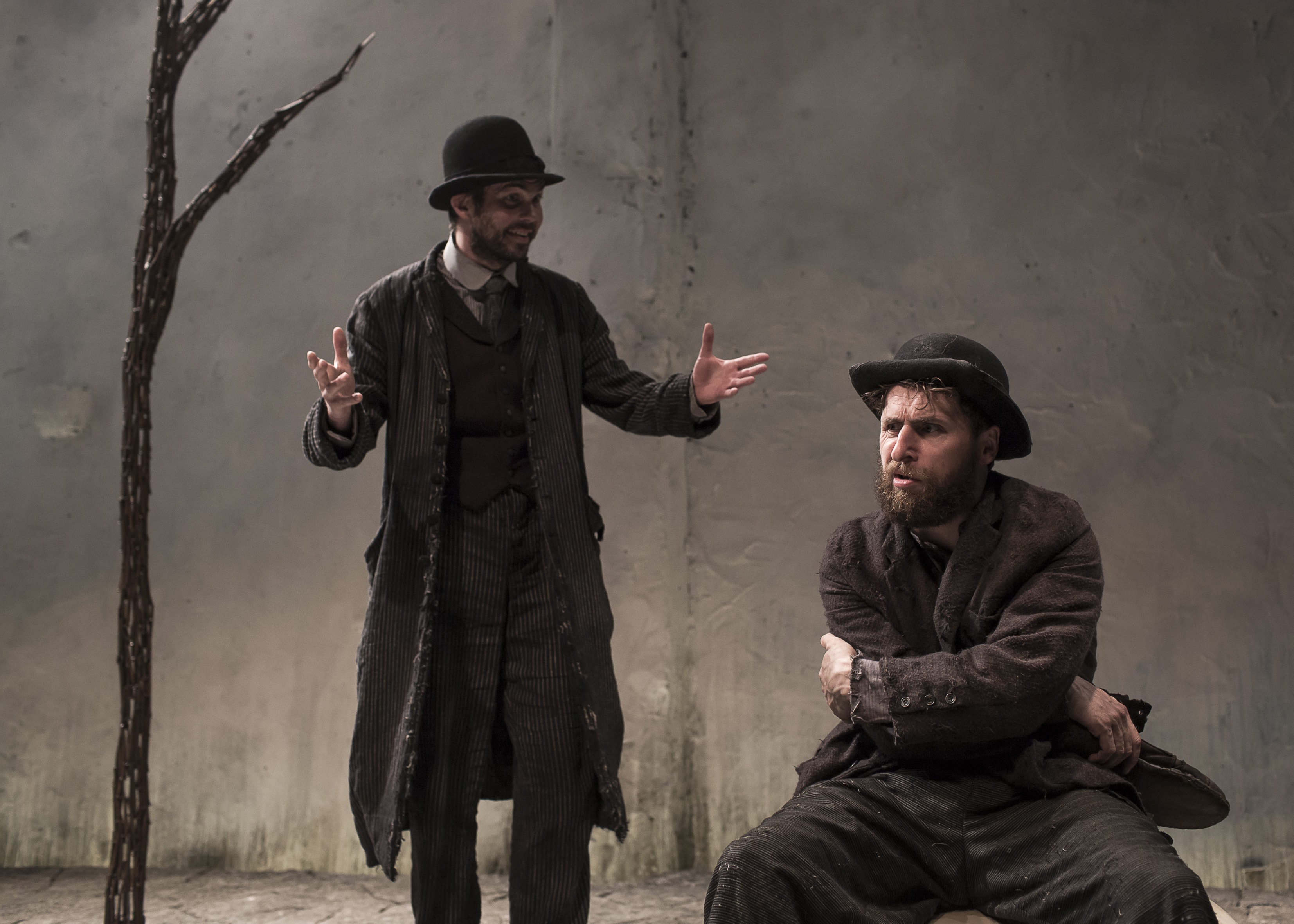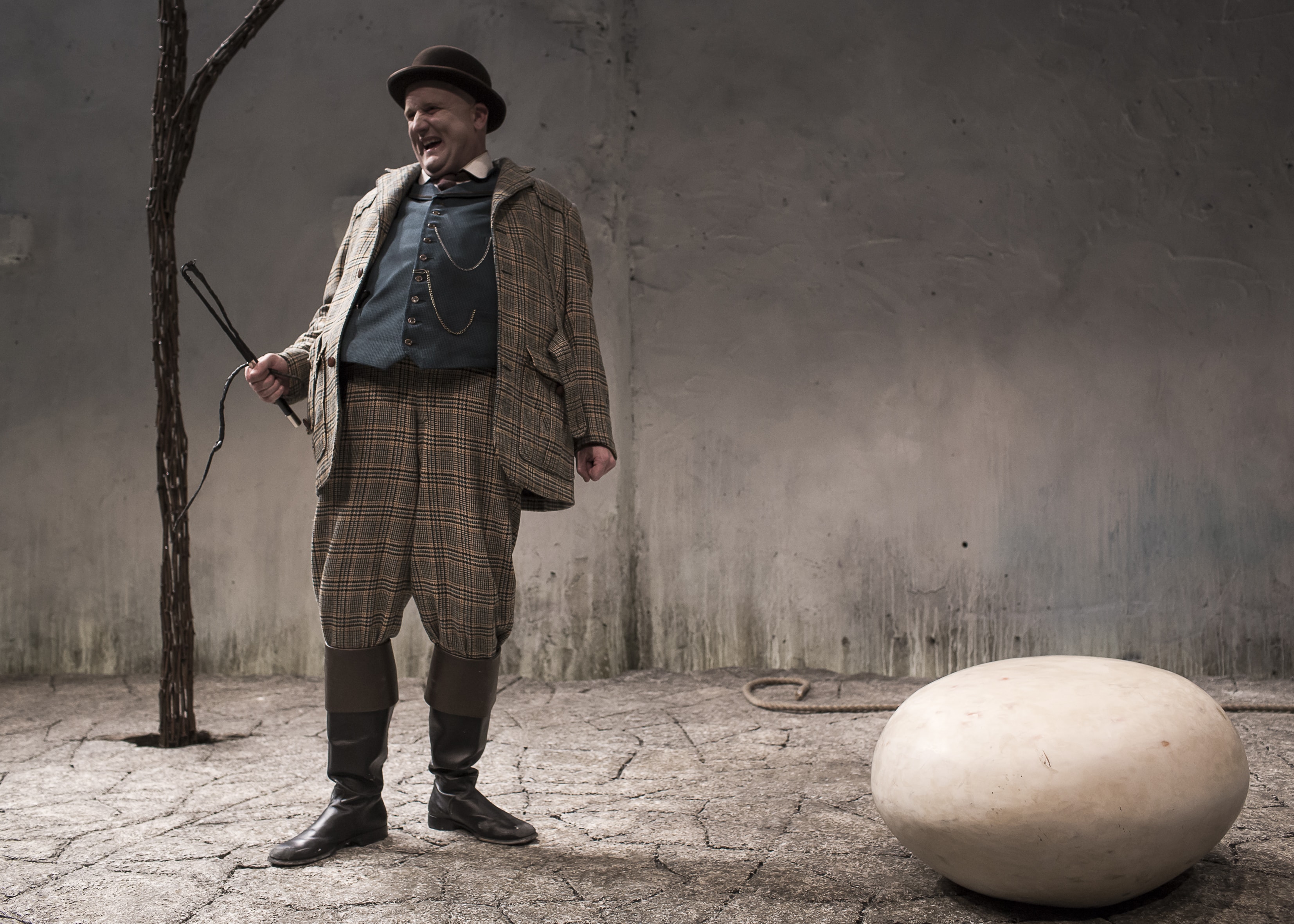“Nothing is funnier than unhappiness,” says Nell in Samuel Beckett’s Endgame. Druid’s production of Waiting for Godot at the Shakespeare Theatre Company proves the truth of this statement again and again. Director Garry Hynes, with her luminous cast: Marty Rea as Vladimir, Aaron Monaghan as Estragon, Rory Nolan as Pozzo, Garrett Lombard as Lucky, and Malcolm Fuller as the Boy, unearth a treasure-trove of comedy in this seminal piece of theater. Godot is not played for laughs; it is entertaining because of the emotional truth underlying the humor.

Shakespeare Theatre Company (STC) is hosting Druid, Ireland’s most celebrated theatre company, in this regional premiere of its international tour. Samuel Beckett, who won the Nobel Prize for Literature, (he wrote poetry and novels as well as plays), revolutionized 20th-century theater by showing how drama could succeed without a conventional plot or psychological realism. Irish director Hynes is the first woman to win a Tony Award for Best Director for the Druid production of Martin McDonagh’s The Beauty Queen of Leenane.
The premise of Godot is a simple one. Two tramps in a bare landscape. A rock. A tree. And magic.
Drawing from vaudeville, the circus, and the music hall, Vladimir (Marty Rea) and Estragon (Aaron Monaghan) fly around the stage with virtuosic glee. Sometimes they argue like ill-matched childhood friends. Sometimes they pose and throw their hats like the dancers in A Chorus Line. Sometimes they lie on the stage barely moving as if they were already dead.
The imposing and entitled Pozzo (Rory Nolan) enters, followed by his slave Lucky (Garrett Lombard) who has a rope around his neck and five or six types of baggage. Lucky doesn’t look up. Nolan’s Pozzo, operatic in voice and mercurial in temperament, resembles, at different times, Winston Churchill, the Commendatore from Mozart’s Don Giovanni, and Lady Bracknell from Wilde’s The Importance of Being Earnest. He believes himself to be the monarch of all he surveys (when he’s not depressed) and the sun never sets on his empire (such as it is). Unlike Vladimir and Estragon, who are traditionally played with Irish accents, his accent is British. He possesses the grand manner of a pooh-bah reluctantly enlightening lazy, inept colonials. There is even a touch of Gilbert and Sullivan in his portrayal. I imagined him breaking into song…”I am the very model of a modern Major-General…” from The Pirates of Penzance.

Pozzo’s slave, Lucky, gives an incomprehensible Joycean monologue, inspiring rounds of delighted applause from the audience. His tone is one of exhortation. He is like Kenneth Branagh’s Henry V giving his St. Crispin’s Day speech to the troops at Agincourt. He might possibly break into “We few, we happy few, we band of brothers…”
Although at first Vladimir and Estragon seem strange, they are the “normal” ones when Lucky and Pozzo arrive. When the two tramps are alone again, it is as if, in the middle of a long railway journey, they were waylaid by a couple of extremely eccentric people who have, thankfully, departed.
At the end of each act, a Boy appears as a messenger from Mr. Godot. Malcolm Fuller is especially poignant in the role. When he backs away from the scene which faces him, he uncovers the fear beneath his polite phrases.
The composition of all the visual elements: costume (Francis O’Connor), lighting (James F. Ingalls) and scenic design (O’Connor, again) is as appealing as a Rembrandt portrait. The colors are brown, tan, ochre, and green, and they are utilized distinctively, particularly in the costumes. The sometimes ominous sound (Greg Clarke)–could be wind, could be music—is always suited to the moment.
Samuel Beckett was a man of paradox. An Irish playwright who spent most of his time outside Ireland. The son of a well-to-do suburban Protestant family, who sought and found the bohemian life in Paris. A melancholy person with a wicked sense of humor.
Although he won the Nobel Prize for Literature, he gave it away. He received the Croix-de-Guerre for assisting the French Resistance during World War II, but never spoke of it.
He could be deeply compassionate and sensitive. His authorized biographer, James Knowlton, recalls with gratitude that when his son was seriously injured in a car accident, Beckett called him every day.
Beckett is the archetypal playwright of uncertainty. He is the ideal author for this perplexing era. What better time to hear those famous lines “I can’t go on. I’ll go on.”
Running Time: Two hours and 45 minutes, with one 15-minute intermission.
Waiting for Godot, presented by Druid Theatre Company at the Shakespeare Theatre Company (STC), plays through May 20, 2018, at Shakespeare Theatre Company’s Lansburgh Theatre – 450 7th St NW, Washington, DC. For tickets, call the box office at (202) 547-1122, or purchase them online.
LINK:
In the Moment: ‘Waiting for Godot’ Interviews with Production Staff by David Siegel




